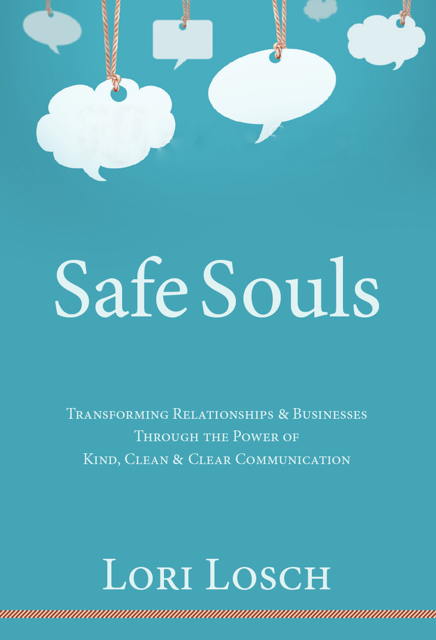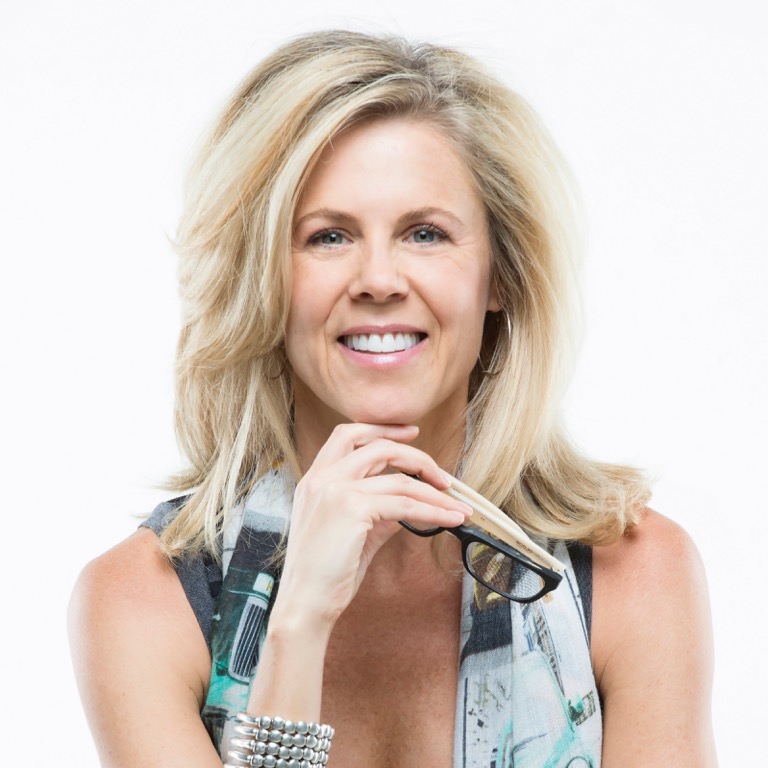
24 May Safe Souls: The Power of Kind, Clean and Clear Communication
This month, in honor of the Emotional category of focus, Lifebook Member and author Lori Losch is sharing a chapter from her newest book Safe Souls: Transforming Relationships and Business with us.

CHAPTER 60
SAFE SOULS: TRANSFORMING RELATIONSHIPS AND BUSINESSES
THROUGH THE POWER OF KIND, CLEAN AND CLEAR COMMUNICATION
BY LORI LOSCH
THE ORIGINS
I recently had the privilege of spending time with Sir Richard Branson on Necker Island, his gorgeous private oasis in the BVIs. Various events took place throughout the week—kite surfing, tennis tournaments, business mastermind sessions, theme parties and more. About 25 people attended, representing 15 different companies. During one of the masterminds, each company’s leader was asked to present a 10-minute TED-style talk. The topic?
… An idea that has added at least $250,000 to the company’s bottom line.
My husband Ken Losch, Founder and CEO of Advanced Green Innovations and Trillium Residential, asked me if he could share Safe Souls—a distinction I created and he subsequently implemented in his own life. I loved that a gathering of international business leaders would soon be hearing about Safe Souls. It has significantly impacted my life, has wildly benefitted Ken’s businesses and has been transformational in our personal relationships, so we’d love for Safe Souls to go global. The world needs more kindness and this formula has the power to usher it in.
SEEDS OF SAFE SOULS
My mom taught me my first lesson on how to be a Safe Soul. She was the embodiment of the saying, “If you don’t have anything nice to say, don’t say anything at all.” She didn’t tolerate gossip, triangulation or criticism (GTC). I might come home from school and complain, “My teacher did this or that. It was so unfair!” My mom would invariably say, “Let’s take a step back. What were you doing to provoke that?” Or, “What might be going on in his world to cause that sort of mood?” While these cross-examinations drove me crazy, I did learn to approach challenges and conflict from a different perspective. I started seeing people with compassion rather than criticism. This compassion, coupled with my super-sensitive and highly intuitive nature, had me long for kindness to permeate every relationship. The Safe Souls formula must have been percolating in me even back then, as I recall my dad saying, “You don’t have a mean bone in your body.” And I longed for everyone to follow suit.
My sensitive disposition and my mother’s DNA likely created a natural or inherent kindness, but after I had experienced many personal betrayals, I committed to never deliberately causing someone to feel betrayed. I didn’t want anyone to feel the discomfort I had felt in so many instances. This was different from inherent kindness—it was a commitment to kindness and to protecting people’s souls. Have I done this perfectly? No. Can I think of a few major betrayals where I came out swinging defensively and have done damage? Yes. Am I proud of that? No. A fight-or-flight instinct can powerfully kick-in when we feel threatened. Growing is a process. None of us will do it perfectly.
SAFETY IS OUR OWN RESPONSIBILITY
As infants, kids, teens and young adults, we have various caretakers—parents, babysitters, teachers and perhaps older siblings. They are supposed to guide, teach and protect us. They are meant to keep our little soul beings safe. Sometimes they do a fantastic job and we wind up with perfectly healthy souls and sometimes they don’t and we wind up with souls full of holes. This is life—we remember, feel, grieve, forgive and hopefully move on gracefully.
As adults, however, we are not only responsible for the souls around us, we are also the keepers of our own souls. Harming another is obviously wrong, but continually putting ourselves in harm’s way is soul suicide.
When I met Ken, I noticed that he, some of his friends, certain family members and many colleagues, often gossiped, triangulated like Bermuda and were quite critical and judgmental. When I mentioned this, he refused to admit they were being toxic and harmful. He said, “You’re just being an overly-sensitive woman,” and, “This is how guys talk and kibitz with each other.”
I pressed.
“Ken, I feel unsafe, particularly in your home. The fighting and backstabbing has me in a constant state of stress. No wonder there’s so much strife—unkindness is rampant. One person is all nice to another’s face, but will turn around and say, ‘he’s such an idiot’ behind his back.” The abundance of negativity literally made me feel sick and nervous.
So, I did my best to effect change, but failed.
Some of Ken’s colleagues also felt unsafe to me. After sitting through a few meetings, I couldn’t help noticing how much they gossiped and how critical they were. Cutting people down was just a part of their normal conversation.
The boardroom had a wide street view so you could easily see the many beautiful, colorful and eclectic people passing by outside. During meetings, the team members would say things like, “Wow, look at the size of her ass.” Or, “What a ridiculous outfit.” Or, “That guy’s clearly trying to be too cool for school.”
Why were these well educated, successful and outwardly kind (at least to me) people being so critical? When I mentioned it to Ken, he didn’t understand or agree with my perceptions. “You’re just being super-sensitive again. This is how guys act.”
But I just couldn’t accept it.
After unsuccessfully trying to effect change, I took a stand for my soul. “I can’t be in this environment anymore. I love you, but I’m not going to spend time at your home or office.” At first, Ken didn’t get it, but my strong position had him take notice. If he wanted me fully back in his world, he had to consider my observations.
Then the proverbial penny dropped.
Ken said, “When I would leave the boardroom for a bio break, I would go really quickly so I could be back ASAP. I didn’t realize it or have the words for it, but now I know that my soul wasn’t feeling safe. If they’re constantly criticizing others behind their backs, they’re most probably doing it behind mine.”
Once Ken understood Safe Souls, he quickly implemented it throughout both companies, in his friendships and with his family. When people get it and adopt it, it’s transformational. Many testimonials have come to us declaring they have never felt as happy and productive at work as they do at AGI and Trillium because they know their souls are safe. Many friends have said they feel so free in our presence because they know they will not be criticized or judged for being themselves. Others have said they are so grateful for the distinction because they didn’t even realize they were being toxic. Conversely, a few have been unable to adopt Safe Souls, and with these people we unfortunately spend very little time.
THE FORMULA
So why isn’t the Safe Souls message simply: Be kind to one another.
In their book, Switch: How to Change Things When Change is Hard, Chip and Dan Heath explain why just saying something vague like, ‘be kind,’ isn’t effective. According to their research, sometimes resistance to change is simply lack of clarity. Humans need specifics. We might agree that being kind is a great idea, but we need direction on how to be more kind.
Sometimes to define light, we first need to define darkness. So, I looked back on my life and analyzed the times when my soul had been shattered. What were the common denominators in each situation? It became clear that three things were consistently present—gossip, triangulation and criticism. Refraining from these became the foundation for Safe Souls.
I also pondered the situations where I felt the highest levels of kindness—both in my actions and in the actions of those around me. Four things were consistently present. These became the Tools for Transformation.
Then I looked at a few, overarching, and powerful mindsets for which to strive. These became the Fourth and Fifth Dimensions.
All aspects of the Safe Souls distinction are specific ways to increase your kindness quotient. The clearer the direction, the more significant the change, the safer the soul.
NO GTC
No Gossip – there is never a place to maliciously discuss someone behind his back.
No Triangulation – if you have a grievance with someone, don’t air it with a third party. Rather, go directly to the source of the grievance. This is kind, clean and clear communication, not a triangle of muck.
No Criticism – live and let live. Don’t criticize or personally judge another’s actions, choices, life philosophies, style, religious beliefs, etcetera.
A caveat to No GTC is when you are managing people. Being responsible for someone’s work performance obviously calls for managerial discussions, constructive criticism and performance reviews. Do these responsibly—with the intention of improving the organization and increasing the individual’s capacity for contribution.
TOOLS FOR TRANSFORMATION
After committing to the basic formula of No GTC, how can you amp up your kindness quotient even further? You can use the four Tools for Transformation.
1. Clearing Conversations
A Clearing Conversation is often the toughest, but most rewarding practice, to implement. Have you ever just known that the energy between you and someone else was not clean and clear? That there were unspoken words and emotions swirling around? That something was bothering you about someone or you sensed that they were bothered by you? I think we all have. What did you do with that tension? Ignore it? Avoid the person? Brush it off? What if you want to live above such muck and mire? You can have a simple Clearing Conversation.
This is such a basic concept—it feels a bit like suggesting you brush your teeth before bed—but, unfortunately, Clearing Conversations are not very commonly practiced. They’re uncommon because they can be uncomfortable. And a person’s reaction to your desire to clear the air is always an unknown. Nonetheless, I can tell you that 98% of the hundreds of Clearing Conversations I’ve had have gone extremely well. The exceptions have been with those that just can’t get vulnerable, be real with their emotions and commit to a higher way. It’s sad when these conversations go wrong, but when they go right, they are magical.
2. Committed Conversations for Action
These strategic conversations with a safe third party are meant to eliminate the possibility of a Clearing Conversation going awry. If you are in an overly-charged emotional state and a Clearing Conversation could do more harm than good, it can be wise to consult a third party first. The caveat is that you must commit to the Safe Soul sounding board that you will immediately schedule a Clearing Conversation with whomever you have the conflict. Ideally the Committed Conversation for Action will be with someone who is not in the same sphere of influence as the person the grievance is towards. This could possibly muddy an otherwise clean and clear relationship.
3. Covering People’s Backs
If we all have each other’s backs in conversation, it ensures that No GTC will be respected. It’s not only a commitment to refraining from GTC personally, but when you encounter it happening with others, you address it and shift the conversation to positive comments and praise about the subject. When people know their backs are covered, they avoid the flight, fight or freeze mode—they are liberated to love, to create and to self-actualize.
Why do we sometimes feel unsafe? It’s Caveman 101. It’s instinct. It’s in our DNA. Cortisol and adrenalin course through our bodies when we don’t feel our backs are covered. We shoot into sympathetic mode. We run, we fight or we retreat. Our bodies don’t know the difference between the threat of a Bengal tiger attack and a group of friends betraying us. Both cause considerable stress and our bodies respond.
4. Public/Private Praise
Praising publicly and privately perform different functions and both are infinitely valuable. When we praise in the company of others, it generates palpable energy, excitement and love. It can even cause people, who may not have seen praiseworthy traits in someone, to suddenly see the light. Private praise is more intimate. It can help solidify and enhance relationships between two people.
THE FOURTH AND FIFTH DIMENSIONS
If No GTC is an elementary level distinction and Tools for Transformation high school, then the Fourth and Fifth Dimensions are courses at the college level of Safe Souls.
It dawned on me a number of months ago that during the span of a few days—and, yes, it did coordinate perfectly with the lunar cycle!—Ken could do nothing right. He was irritating me at every turn. His words were jarring, his motions were annoying and I didn’t even want to be in his presence. I became emotionally aloof and physically distant. He was highly confused.
Then it dawned on me that I was being toxic. I was not practicing Safe Souls in my thinking. My mind was full of criticism and judgment. The Fourth Dimension is about being mindful of practicing Safe Souls even in our thoughts—especially in our thoughts—as our thoughts become our attitudes and our attitudes often become our words. Why not keep them empowered so we can become empowering?
When I noticed I was being an unsafe soul towards Ken, I pulled out a few tools. First, I washed my mouth out with SOAP:
Stop
Own It (admit my error)
Apologize
Praise (transform my negative thoughts into positive ones).
Then I had a Clearing Conversation. He graciously forgave me and we had a good laugh about what a Holstein I had been.
I never beat myself up when I temporarily fail at being a Safe Soul. In fact, if we claim that people never irritate us or that we never harbor unsafe thoughts, we would be lying. The transformation is in how fast, once we notice the deviation from our commitment, we course correct. Do we humble ourselves and quickly confess our error, restoring the other’s sense of safety and our own integrity?
The Fifth Dimension includes gossiping about, triangulating with or criticizing ourselves. And if you don’t think one person can triangulate, you have not heard the committee in my head! Acknowledging and clearing our own thoughts and emotions is vital.
The saying, Beware of the naked man offering you the shirt off his back… is poignant. We can’t be safe for others if we aren’t safe for ourselves. We can’t offer love if we don’t harbor self-love. We often criticize ourselves more than we would criticize our worst enemy.
Have you considered your self-talk lately? I encourage you to jot down the opposite of any GTC thoughts you have about yourself. Replace, “I’m so freaking lazy,” with, “I am a productive and active machine!” Trade, “Why do I get frustrated?” with, “I live life gracefully.” Exchange, “I’m such a bad auntie,” with, “My nieces and nephews love me!” Get it?
If we all practiced No GTC, used the Tools for Transformation and adhered to the Fourth and Fifth Dimensions, we’d live in a world of immense positivity and productivity. Kindness would be rampant. Peace would rule. People would be empowered. We’d soar way above our basic needs for safety, shelter and sustenance. Love, kindness and prosperity would abound, and . . .
THE UNIVERSAL GOLDEN RULE WOULD PERMEATE HUMANITY.
This is my vision. Will you join me?

About Lori
Once a multiple-award-winning realtor in Vancouver, Canada, Lori Losch recently relocated to Phoenix, Arizona and launched several new careers as: a mobile app developer, children’s book author, adult nonfiction author and a workshop creator/facilitator.
Part adventure nut, part creative businesswoman and part philanthropist, she has summited Mount Kilimanjaro and Mount Kenya and has trekked to Mount Everest
Base Camp in the Himalayas, as well as the Salkantay and Inca Trails in the Andes. She supports organizations that advance prosperity and healing, as well as animal welfare, in the countries she explores.
As the cofounder of We’re Making it Our Beeswax, a women’s empowerment program, Lori has trained rural Zambian women in the art and business of beeswax candle making, sales and marketing. These skills enable them to create an income for themselves and their families, where previously there was little hope of doing so.
Lori also cofounded the Answer for Cancer Tour, a 2-month/20,000-mile motorcycle tour amplifying the message of cancer prevention. She rode forty-five states and seven Canadian provinces on her Honda CBR600 sport bike, helping to raise $500,000 for the cause. In doing so, she brought cancer-prevention strategies to untold thousands via live events, radio talk shows, TV interviews and print media.
While serving on the Canadian board of Prevent Cancer Now, she designed and developed a mobile app called Prevent Cancer: 365 Daily Tips to help fund the organization. In keeping with her love of inspiring healthy living, she also created
Stretch Guru, a popular mobile app series designed to mitigate an athlete’s risk of injury. HealthTap doctors rate Stretch Guru: Run in the top 10 paid-for running apps.
Lori’s children’s books, Bumbles … finds her way home! and Bumbles … saves Naipoki!, serve to entertain and educate children, and to bring awareness and financial support to the causes they champion. They are available through Amazon.
But perhaps the closest endeavor to her heart is the Safe Souls movement. Lori’s
book, Safe Souls: Transforming Relationships and Businesses Through the Power of Kind, Clean and Clear Communication, is due out in early 2016 and she is currently presenting its content in a workshop format. She has a vision of a world exploding with kindness, where all people are empowered to self-actualize because they feel free to be themselves—knowing their ‘tribes’ have their backs.
Lori lives with her amazing husband, Ken, and their sweet and hilarious dogs, Parker and Milo
